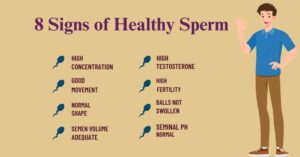Most fertility talk is centered around women; however, the fact remains that male fertility is an equally important aspect of infertility. About 40-50% of infertility cases could be attributed to male factors, and sperm health is a key determinant of male fertility. Understanding the 8 signs of healthy sperm is essential for any man intending to have children now or in the future.
How do you tell if your sperm is healthy? Doctors usually assess sperm through a semen analysis, but there are also some general signs and factors that you can be aware of. This post, however, will show the major 8 signs of healthy sperm that every man ought to know.

Optimal Sperm Count
It is the first and one of the most obvious indications of fertility. The World Health Organization (WHO) specifies a normal sperm concentration as at least 15 million per milliliter of semen. Lower than that will not make the process impossible, but certainly, it will make it more difficult. Signs of a good sperm count include: Normal volume of ejaculation-about 1.5-2 ml or more.
- No discernible differences in color or texture of semen.
- Regular sexual health: no infections.
Why It Matters: A higher sperm count increases the chances that sperm are going to reach an egg in the end and fertilize it. Low sperm count does not mean you cannot conceive, but it is usually harder to achieve it.
Strong Motility
Sperm motility is the ability of the sperm to move effectively. In fact, healthy sperm for fertilization should swim vigorously through the most difficult task cervical mucus. Healthy sperm motility means at least 40% of sperm are moving. Over 32% are moving progressively (that is, moving straight and not in circles). Signs of good motility are not likely to be found there without a lab test, but rather healthy lifestyle choices like exercise involvement and healthy food consumption usually support good sperm motility.
Why it matters: If sperm can’t swim properly, they are going to fail to reach the egg.
Properly Shaped and Properly Sized:
Sperm morphology refers to the size and shape of sperm. A healthy sperm will have the following features: Oval head Defined midsection Long straight tail Sperm with an abnormal shape, i.e., double heads, bent tails, etc., would fertilize an egg less frequently. Signs of proper morphology would include: No genetic disorder in the history. There were no damaging toxins such as pesticides or heavy metals. There were no chronic diseases affecting the sexual organs. Why it matters: Since sperm are well shaped, they swim better and hence are more successful in fertilization.
Healthy Semen Volume and Consistency
Semen is the fluid that transports sperm out of the body during ejaculation. Healthy semen helps to protect and nourish sperm. Whereas normal semen should
- Have a volume of between 1.5 and 5 ml per ejaculation.
- Be whitish-grey in color.
- Have a thick, gelatinous consistency-at least until the end of 30 minutes, when it liquefies.
Signs of good semen health:
– No blood or abnormal color.
– No foul smell.
– Pain-free ejaculation.
Why all these matters: Semen provides a medium for sperm mobility and protects the sperm from the acidic environment of the vagina.
Optimal pH
Semen pH is another good indicator for assessing the health of the sperm. The pH of normal semen ranges from 7.2 to 8.0; hence, semen is slightly alkaline.
Signs of normal pH balance:
– Absence of symptoms of infection.
– Absence of unusual discharge, which means normal sexual health.
Why all these matters: Abnormal pH may affect the motility and function of the sperm and reduce the chance of fertilization. An acidic environment can damage the sperm or even immobilize them.
Low DNA Fragmentation
Normal sperm parameters in terms of count, motility, and morphology are, however, not enough; DNA integrity matters. DNA fragmentation in sperm adversely affects the processes of fertilization and may result in miscarriage and the birth of abnormal offspring.
Some signs that your sperm may have healthy DNA:
- Follow these rules for a healthy lifestyle: no smoking, only limited alcohol use, and regular exercise.
- No high-temperature exposure (for example, hot tubs, laptop on lap).
- Adequate intake of antioxidants (vitamins C, E, selenium, and zinc).
Why it matters:
Good integrity of the DNA increases the likelihood that, if fertilization occurs, the embryo will develop normally.
Absence of Oxidative Stress
Oxidative stress is when free radicals surpass antioxidants inside the body. It damages the sperm severely, leading to reduced motility, decreased numbers, and abnormal morphology.
Indicators of a low level of oxidative stress may include:
- Adequate enzymes from a high-antioxidant-based dietary regimen.
- Moderate exercise is done regularly.
- Minimal conservation from pollution, radiation, and chemical toxins.
Why it matters:
Reduced oxidative stress guarantees that the sperm remains active, abundant, and very fit, which increases the chance of fertility.
General Physical Health and Hormonal Balance
Healthiness and hormonal balance (that is, testosterone) are greatly influential in determining sperm production and quality.
Indicators of good hormonal and general health are:
- Well-established sleep cycles.
- Reduced stress exposure.
- Healthy body weight (BMI normal).
Significance:
Hormones like testosterone, follicle-stimulating hormone (FSH), and luteinizing hormone are responsible for sperm production. Accumulation and diagnosis of physical illnesses like diabetes, obesity, and infections stall sperm quality.
Handy Tricks to Improve Sperm Health:
It is important to know the 8 signs of healthy sperm; however, it is equally important to learn the ways of improving one’s sperm quality.
- Nutrition: Diets filled with fruits, vegetables, whole grains, and lean proteins increase fertility.
- Exercises: The regular performance of moderate physical activity improves hormonal balance and sperm quality.
- Sleep: Good sleep lasting from 7 to 9 hours a night helps support healthy sperm production.
- Stress management: Alleviation of chronic stress is found to be directly proportional to an improvement in the testosterone level and production of sperm.
- Avoidance of toxic substances: limit exposure to pesticides, heavy metals, radiation, and other nasty, dangerous chemicals.
- Stop smoking: the use of smoke reduces both the quality and number of sperm.
- Keep cool: stay clear of protracted exposure to heat sources (hot tubs, saunas, tight underwear).
Read More: 10 Powerful Ways to Increase Sperm Count Naturally
When to Get a Doctor.
Even if you’re healthy, attempt consulting a fertility expert if you’ve been trying to get pregnant with your partner for over 12 months (or 6 months if over 35) without success.
Warning signs to consult a physician may include:
- Erection or ejaculation difficulties.
- Low sexual drive.
- Pain or swelling in testicles.
- History of surgery or trauma in the genital area.
Semen analysis is considered the gold standard test for measuring sperm health. Other advanced tests that may be ordered include sperm DNA fragmentation tests and hormonal profiles.
Conclusion:
To Trust the Experts on Your Journey to Fertility Understanding and recognizing the 8 signs of healthy sperm empower you to take control of your fertility journey. Simple lifestyle changes, awareness of your body’s signals, and timely medical interventions can make a significant difference.
So, if you intend to start a family and want to ensure that your sperm health is at its best, seeking expert advice is crucial. One of the leading fertility clinics, Nimaaya IVF Center, offers complete male fertility assessments and advanced treatment. They have a dedicated team of experts that focus on all aspects of diagnosing and treating male factor infertility and developing individualized solutions to help achieve one’s dreams of becoming a parent.
Trust Nimaaya IVF Center to guide you with expertise and compassion to success through your fertility journey.
FAQ
How to check sperm health at home?
You can get a basic idea of sperm health using at-home semen analysis kits, which measure factors like sperm count and motility. However, for a complete and accurate assessment, a lab-based semen analysis is recommended.
How often should a man ejaculate for healthy sperm?
There is no perfect frequency, but 2–3 times per week is generally healthy. Regular ejaculation helps refresh sperm stores and improve quality, especially when trying to conceive.
Where can I get help if I suspect sperm issues?
If you’re concerned about your sperm health or struggling to conceive, visit a fertility clinic. Nimaaya IVF Center offers expert male fertility evaluations and treatments tailored to your specific needs.


